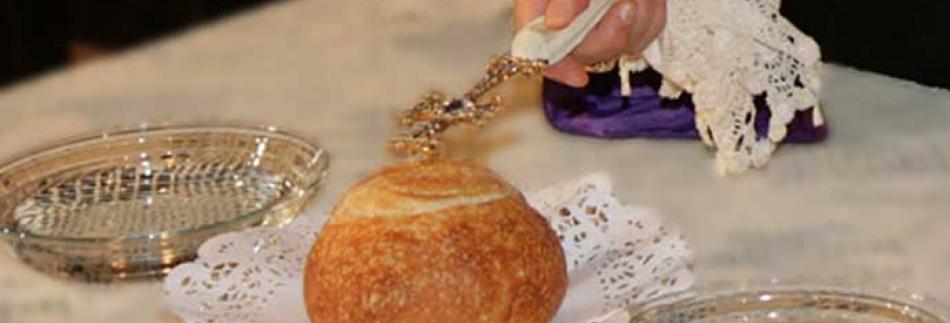
The home is a sacred place where family members maintain and share many values. It is also a place where they are charged and empowered with these values to live a peaceful and God-pleasing life. It is under this roof that all collectively form oneness in spirit and assume an important responsibility in the life of the community. It is in this place where they break bread and share joys and sorrows. Here the presence of the Omnipotent is felt since every family is a miniature of a "Little Church—Ecclesia." In this "Little Church" the inexhaustible love and the very generous blessing of God permeate.
According to the sacred traditions of the Armenian Church, God's blessing is asked for homes on different occasions, like on the Nativity and the Resurrection of Christ, as well as on the joyous occasion of moving into a new home.
For Home Blessing the priest takes with him wafer and incense. He blesses the bread, the water and the salt. These three fundamental elements are essential life-giving gifts for human life. The priest asks from the Omnipotent God not to lessen these three gifts without which life becomes impossible or imperfect.
The bread, the water and the salt are symbols of God's infinite goodness and care. With the blessing of these great gifts the household is enriched spiritually and its existence perpetuated for the service of his Creator.
The bread, which symbolically represents the Word of God, grants life to all those who taste it. The salt seasons our food and makes it delicious and edible. Metaphorically salt represents man in this world with his words and deeds. Christ said, "You are the salt of the earth." Man's life should be seasoned with wisdom, moderation or sense of sufficiency. Finally, water which is the most essential element of life, figuratively represents cleanliness. It's through water that we are cleansed by baptism, renewed in Christ, and united with Him.
Along with the bread, salt, and bread offered on a tray by the dwellers, the priest places also the wafer stamped with a crucifix and designs of grapes and wheat. The wafer is the presence of Christ in the home. The members of the family can either distribute the wafer among themselves or keep it in a jar along with flour, salt, or rice.
During Home Blessing it is customary to burn incense which symbolizes the burning of our souls with our Lord's love. In his supplication the Psalmist says, "Let my prayer be counted as incense before Thee."
In the prayer of the Home Blessing the priest after asking for purity and abundance of the three gifts, he blesses the home and all its dwellers and asks God to keep them away from visible and invisible enemies and protect them under His powerful Right Hand granting them health of soul and body.
Home Blessing is a meaningful religious service that brings the entire family together in oneness and holiness, and blesses them. Through this ceremony everyone's faith is replenished and strengthened and the Lord's presence is felt.
The beautiful tradition of the Home Blessing unfortunately has been cast into oblivion. Today, more than ever, we need the presence and blessing of the Lord in our homes and lives. The revival of this centuries old custom will certainly bring us close to our Lord. Family members are encouraged to take part of the ceremony to make it more meaningful.
In the old country it was a tradition to offer a gift to the visiting priest by the family, as a token of appreciation, however you are not required to do so, Fr. Mesrop will be glad to come and bless your homes without any expectation.
This article is courtesy of the Eastern Diocese of the Armenian Church.